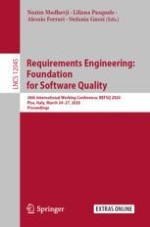2020 | OriginalPaper | Chapter
Generation of Formal Requirements from Structured Natural Language
Authors : Dimitra Giannakopoulou, Thomas Pressburger, Anastasia Mavridou, Johann Schumann
Published in: Requirements Engineering: Foundation for Software Quality
Publisher: Springer International Publishing
Activate our intelligent search to find suitable subject content or patents.
Select sections of text to find matching patents with Artificial Intelligence. powered by
Select sections of text to find additional relevant content using AI-assisted search. powered by
